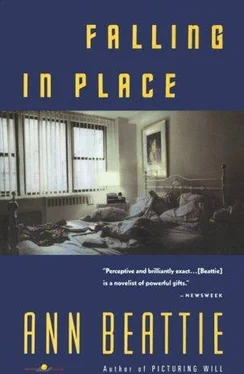Ann Beattie - Falling in Place
Здесь есть возможность читать онлайн «Ann Beattie - Falling in Place» весь текст электронной книги совершенно бесплатно (целиком полную версию без сокращений). В некоторых случаях можно слушать аудио, скачать через торрент в формате fb2 и присутствует краткое содержание. Год выпуска: 1991, Издательство: Vintage, Жанр: Современная проза, на английском языке. Описание произведения, (предисловие) а так же отзывы посетителей доступны на портале библиотеки ЛибКат.
- Название:Falling in Place
- Автор:
- Издательство:Vintage
- Жанр:
- Год:1991
- ISBN:нет данных
- Рейтинг книги:4 / 5. Голосов: 1
-
Избранное:Добавить в избранное
- Отзывы:
-
Ваша оценка:
- 80
- 1
- 2
- 3
- 4
- 5
Falling in Place: краткое содержание, описание и аннотация
Предлагаем к чтению аннотацию, описание, краткое содержание или предисловие (зависит от того, что написал сам автор книги «Falling in Place»). Если вы не нашли необходимую информацию о книге — напишите в комментариях, мы постараемся отыскать её.
Falling in Place — читать онлайн бесплатно полную книгу (весь текст) целиком
Ниже представлен текст книги, разбитый по страницам. Система сохранения места последней прочитанной страницы, позволяет с удобством читать онлайн бесплатно книгу «Falling in Place», без необходимости каждый раз заново искать на чём Вы остановились. Поставьте закладку, и сможете в любой момент перейти на страницу, на которой закончили чтение.
Интервал:
Закладка:
They were on Madison Avenue, where they had gone to pick up a photograph of some relative that Parker’s mother had dropped off to have restored. The man in the store had carefully lifted the tape that sealed the brown package, separated the two pieces of cardboard inside, and revealed to them the enlargement of a picture of a lady in a gray blouse, with buck teeth and a gray-blue flower in her hair — some relative that Parker didn’t know. The original, the man said, was in the envelope. The envelope was taped to one of the pieces of cardboard. The man smiled over the counter at them. “Is there a family resemblance?” he said, cocking his head at Parker. “She’s ugly and I’m fat,” Parker said, fanning his shirt away from his stomach. “What do I owe you?” Parker’s mother had given him a blank check, and he filled in the amount. Earlier in the day he had filled in a check at the railroad station, and then again at the shrink’s. All the cash he had was eight dollars, and since the bus was too hot, that would all go to splitting the cab fare to and from Grand Central.
“She looks like a spitz,” Parker said, the package under his arm.
“A what?”
“That dog. Isn’t it called a spitz?”
A thin black woman with her hair in a bun passed them, pushing a white baby in a stroller. Parker showed her his stomach to shock her, but she didn’t shock. She just kept walking, looking at the wheels of the stroller.
“So when do you get your braces?” Parker said.
“Next week. I don’t know.”
“Then you’re going to have to brush your teeth all the time,” Parker said. “Every time you eat. Otherwise that stuff will get in your braces and putrefy.”
“I don’t care,” John Joel said.
“Putrefy is a good word,” Parker said. “Can we get something to eat?”
“I’m supposed to buy, right?” John Joel said. “Right?”
“Where do you get all your money?” Parker said.
“Mostly from my grandmother. She didn’t use to give us money, but she feels bad that she doesn’t like us. She likes my brother, but he’s a baby. She gives Mary and me money. Not all the time, but maybe every other week or so. She gives Mary more than she gives me.”
“So why does the kid live with her?” Parker said.
John Joel shrugged. “Where do you want to eat? That place?”
“I get sick of hamburgers.”
“That’s what I want, though. So that’s what I’m going to buy you. What did you want?”
“Éclairs.”
“We can get some éclairs. Let’s get a hamburger.”
“Where can we get éclairs?”
“We can even get them at Grand Central. Let’s get a hamburger.”
“Okay,” Parker said.
They went inside. A fan was aimed at the counter, and square glass ashtrays were on top of the napkins so they wouldn’t blow away. There was a sign asking people not to smoke. Parker saw the sign and put his unlighted cigarette back in the pack in his shirt pocket. He smoked Salems. He played with the edge of his napkin, waiting for the man behind the counter to take their orders. He took out a cigarette again and tapped it on the counter but didn’t light it.
“You ought to see the stuff across the street, down at the Whitney Museum,” John Joel said. “I was in there with a friend of my father’s last week. All these plaster people sitting around on subway cars or sprawled in bed. Some of them are naked. Some of them are painted colors.”
“Let’s go there,” Parker said.
“I was just there.”
“So? It’s right down the street.”
“It costs money.”
“Listen: I tell my mother we went to the Whitney and show her the stubs, she’ll give you back the money you paid for both of us to get in, I promise.”
“What do you want to go to an art show for?”
“Why’d you go?”
“I told you. My father’s friend took me there. We were killing some time between the orthodontist and my father meeting us for lunch. My father gets on this thing that I should be escorted around New York.”
“We going or not?” Parker said.
“If your mother’s paying me back, we can go. It’s no big deal. It’s just a pretty weird art show.”
“I want to see the naked plaster people,” Parker said. “Are they real thin?”
“They’re average.”
“Are they fucking?”
“They’re just lying in bed. They’re asleep.”
“But they’re naked, right?”
“What?” John Joel said. “Didn’t you ever see anybody naked in bed?”
“I just think that’s a pretty weird art show,” Parker said.
“No smoking,” the man behind the counter said.
“What?” Parker said. “I’m tapping out a song that’s going through my head, that’s all. We want a couple of hamburgers.”
“What with them?”
“French fries. Two orders,” Parker said. “Coke for me.”
“Cow juice,” John Joel said. There was a sign on the wall that advertised milk as cow juice.
“What song’s going through your head?” the counterman said. He turned and began filling a glass with ice.
“ ‘Stayin’ Alive,’ ” Parker said. “You see Saturday Night Fever?”
“That show where they do the gag routines,” the counterman said. “Sure I’ve seen it.”
“Uh-uh,” Parker said. “The movie with John Travolta in it.”
“What am I talking about?” the counterman said.
“You’re thinking of Saturday Night Live.”
“Yeah,” the counterman said. “The blonde’s pretty. The one who gives the news. Not any prettier than the one who gives the news for real, though. Some of the stuff’s funny.”
“You know that song?” Parker said. He took out a book of matches and put it on the counter and flipped open the cover with his thumb.
“Nah,” the counterman said. “I don’t go to movies with actors in ’em. I go to see actresses.”
“There were girls in it.” Parker tore out a match.
“What I read,” the counterman said, “it was about John Travolta.”
“Hey,” the other counterman said, turning away from the grill and wiping his forehead on his arm. “You going discoing this weekend, Sal? That what you’re talking about?”
“That’ll be the day,” Sal said.
“ ‘Disco, Disco duck,’ ” the other counterman sang, turning hamburgers on the grill.
“He goes discoing,” Sal said. “Sure. Look at him. Look at him shake. During the day he stands in front of the grill and shakes. Nights, it’s his ass. Show the boys,” he said, and laughed. His laugh turned into a cough.
“I don’t show boys,” the other man said.
“Saturday Night Fever, Saturday Night Live, who keeps it straight?” Sal said. “Two fries, right?”
“You ought to see that movie,” Parker said. “I saw it when it was R-rated. It’s changed now, but there wasn’t that much good stuff to begin with, so it’s pretty much the same.” He had lit the match. He watched the flame burn toward his finger, then blew it out.
“Day I pay to see John Travolta dance,” Sal said.
“Day you do anything you don’t do every other day, I’ll stand up on this grill and do a slow fry. Flatten myself down on this grill like a hamburger and sputter. You going to a disco. I’d like to see that.”
“A priest goes to the disco in the movie,” Parker said.
“A real priest?” Sal said.
“Well — he’s thinking about not being one anymore.”
“He goes back to the church, I bet,” Sal said.
“Nope,” Parker said.
“So what does he do?”
“He drives off. I don’t know what he does. I don’t think they say.”
“So everybody’s still riding off into the sunset. When I went to pictures and I was a kid that’s what they did. Still doing it, huh? Priest doesn’t know what he’s doing. Shit. Quit one thing for another. Day I do that, you better get up on that griddle and melt yourself, Robby. You’ll know the world is in sorry shape the day I do that.”
Читать дальшеИнтервал:
Закладка:
Похожие книги на «Falling in Place»
Представляем Вашему вниманию похожие книги на «Falling in Place» списком для выбора. Мы отобрали схожую по названию и смыслу литературу в надежде предоставить читателям больше вариантов отыскать новые, интересные, ещё непрочитанные произведения.
Обсуждение, отзывы о книге «Falling in Place» и просто собственные мнения читателей. Оставьте ваши комментарии, напишите, что Вы думаете о произведении, его смысле или главных героях. Укажите что конкретно понравилось, а что нет, и почему Вы так считаете.












